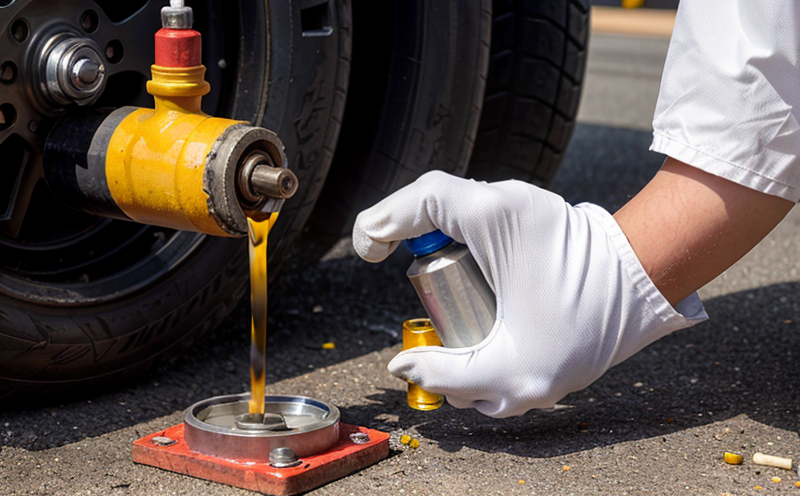ASTM D1319 Hydrocarbon Composition Testing of Fuels
The ASTM D1319 standard provides a method for determining the hydrocarbon composition of distillate fuels, such as diesel and kerosene. This comprehensive testing is essential in ensuring fuel quality across various marine applications, including shipboard engines, generators, and boilers.
Hydrocarbon content can significantly impact engine performance, emissions, and overall fuel efficiency. By accurately quantifying the hydrocarbons present, ASTM D1319 allows for precise control over fuel blending and ensures that the fuel meets the stringent requirements set by international standards like ISO 8217:2017.
The test involves several steps to obtain a representative sample of the fuel. Once collected, the sample undergoes preliminary analysis to ensure it is suitable for testing. This includes checking for moisture and particulate matter, which can interfere with accurate results. The sample is then prepared by distillation, where it is heated under controlled conditions to separate different fractions based on their boiling points.
The resulting fractions are analyzed using gas chromatography (GC), a technique that separates the components of the fuel mixture into individual hydrocarbons. This separation allows for detailed quantification of each component's concentration within the sample. The results provide valuable insights into the fuel's quality and help identify potential issues such as contamination or improper blending.
The precision and accuracy of ASTM D1319 are critical in ensuring that fuels meet regulatory requirements and perform optimally in marine engines. By adhering to this standard, manufacturers and operators can ensure consistent fuel quality across their fleet, leading to improved engine performance and reduced emissions.
For instance, shipping companies operating worldwide must comply with stringent regulations regarding the use of compliant fuels to minimize environmental impact. ASTM D1319 plays a vital role in ensuring that these regulatory requirements are met by providing reliable hydrocarbon composition data.
The test also supports research and development efforts aimed at improving fuel efficiency and reducing harmful emissions. By understanding the exact composition of the fuel, engineers can optimize engine performance and develop new blends that meet evolving standards.
- Ensures compliance with ISO 8217:2017 for marine fuels
- Serves as a basis for blending fuels to achieve specific properties
- Supports regulatory requirements for environmental protection
The testing process is highly standardized, ensuring that results are consistent and comparable across different laboratories. This standardization is crucial in the marine sector where consistency of fuel quality is paramount.
In conclusion, ASTM D1319 Hydrocarbon Composition Testing of Fuels is an indispensable tool for maintaining high standards of fuel quality in the maritime industry. By providing detailed information on hydrocarbon composition, it helps ensure that fuels meet regulatory requirements and perform optimally in marine engines.
Scope and Methodology
The scope of ASTM D1319 is to determine the total and individual concentrations of hydrocarbons present in distillate fuel oils. This method is applicable to diesel fuels, kerosene, and other similar products that are used as marine fuels.
For this test, a representative sample of the fuel is collected and prepared for analysis. The preparation includes ensuring the sample is free from water and particulate matter that could interfere with the testing process. Once prepared, the sample undergoes distillation to separate it into different fractions based on their boiling points. These fractions are then analyzed using gas chromatography (GC) to identify and quantify each component of the fuel.
The methodology outlined in ASTM D1319 specifies precise procedures for sample collection, preparation, and analysis. It also includes detailed instructions for interpreting the results obtained from GC. The standard ensures that all laboratories conducting this test follow a consistent approach, leading to reliable and reproducible results.
By adhering strictly to these guidelines, laboratories can ensure that their findings are accurate and credible. This is particularly important in a sector where fuel quality directly impacts engine performance and emissions. The precision and accuracy of ASTM D1319 contribute significantly to maintaining the high standards required for marine fuels.
Industry Applications
Diesel Fuel Quality Assurance: Ensuring that diesel fuel meets quality standards is crucial for preventing engine malfunctions and extending equipment lifespan. ASTM D1319 helps in this regard by providing detailed hydrocarbon composition data.
Regulatory Compliance: Marine operators must comply with international regulations such as ISO 8217:2017. Hydrocarbon testing using ASTM D1319 ensures that fuels meet these standards, thereby facilitating compliance.
The results of ASTM D1319 are used in various applications within the marine industry. For instance, shipyards use this data to optimize fuel blending processes. By understanding the exact composition of their fuel, they can tailor blends to achieve specific properties such as lower viscosity or improved ignition quality.
Shippers and logistics companies also benefit from accurate hydrocarbon composition testing. It allows them to monitor fuel quality throughout its lifecycle, ensuring that it remains consistent with initial specifications. This is particularly important when dealing with long-distance transportation where any deviation in fuel quality could lead to significant operational disruptions.
Eurolab Advantages
EuroLab offers unparalleled expertise and advanced facilities for ASTM D1319 Hydrocarbon Composition Testing of Fuels. Our team of experienced chemists ensures that every test adheres strictly to the standard, providing reliable and reproducible results.
State-of-the-art GC Instruments: Equipped with cutting-edge gas chromatography instruments, EuroLab can provide precise quantification of hydrocarbons in fuel samples.
Comprehensive Reporting Services: Our reports include detailed breakdowns of the hydrocarbon composition along with insights into potential quality issues and recommendations for improvement.
We understand that maintaining high standards of fuel quality is critical to the success of your operations. EuroLab’s commitment to accuracy, reliability, and consistency ensures that you can trust our results. Whether you are a manufacturer or an operator, we offer tailored solutions to meet your specific testing needs.





